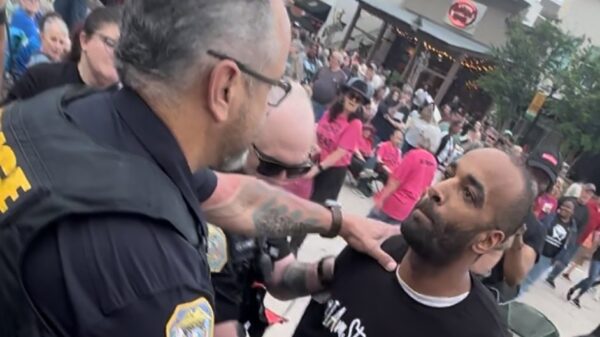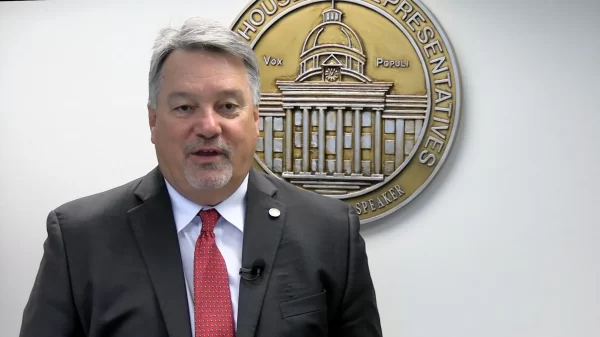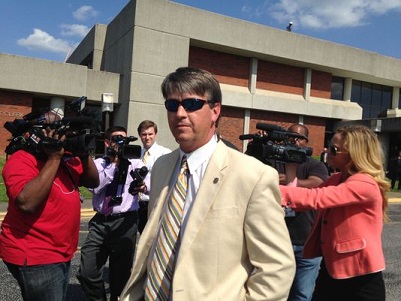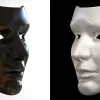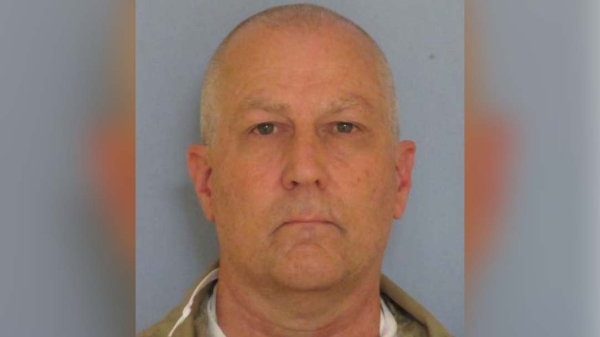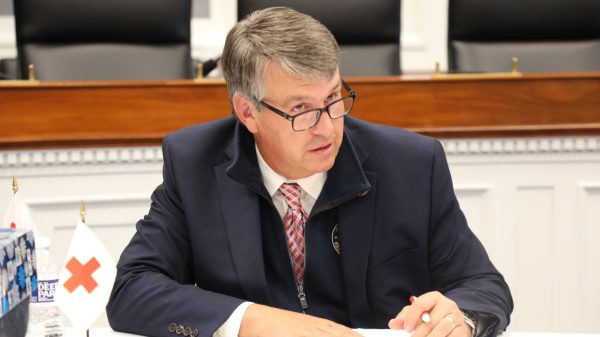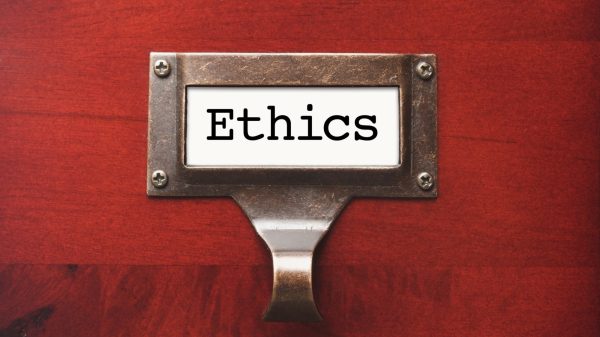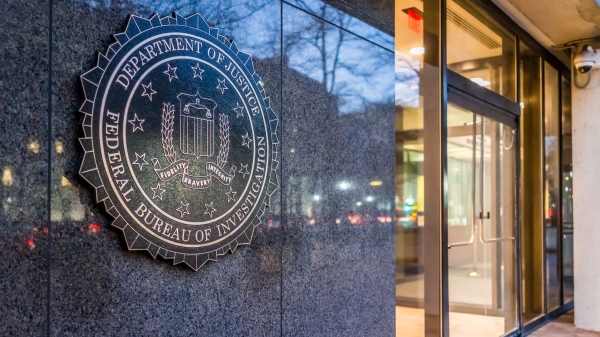By Bill Britt
Alabama Political Reporter
MONTGOMERY—At around 2:00 p.m., the Prosecutors in the Barry Moore perjury and lying case, filed a brief in opposition to Moore’s attorney’s motion.
The brief, filed by Acting Attorney General Van Davis and Matt Hart, is in support of its arguments before the court on May 20.
The brief argues four points:
- Moore’s arguments to dismiss the perjury charges are based on outdated language and otherwise misapply Alabama law.
- The prosecutors have clear authority to appear before the Lee County Special Grand Jury and prosecute Moore for the crimes with which he has been charged.
- Moore’s subpoena to the Attorney General’s Office should be quashed.
- Moore’s remaining arguments are without merit.
The State recessed that the court enter an order (1) denying Moore’s Motion to Dismiss; (2) quashing Moore’s Subpoena Duces Tecum to the Attorney General’s Office; and (3) striking the “Defendant’s Brief in Opposition to Motion to Quash Subpoena Duces Tecum” as an untimely Reply Brief in Support of Moore’s Motion to Dismiss.
Judge Walker is expected to rule on the hearing next week.
IN THE CIRCUIT COURT OF LEE COUNTY, ALABAMA
STATE OF ALABAMA,
v. CASE NO. CC-2014-000226
FELIX BARRY MOORE,
Defendant.
STATE’S BRIEF IN SUPPORT OF
ITS ARGUMENTS AT THE MAY 20, 2014 HEARING
The State of Alabama hereby submits its Brief in Support of its Arguments
at the May 20, 2014 Hearing. This Court has allowed the State to respond to
defendant Felix Barry Moore’s (“Moore”) arguments raised orally at the hearing,
as well as to Moore’s “Brief in Opposition to Motion to Quash Subpoena Duces
Tecum,” which was filed after the hearing. For the reasons stated below, Moore’s
Motion to Dismiss is due to be denied, his subpoena duces tecum to the Attorney
General’s Office should be quashed, and Moore’s untimely Brief should be struck.
INTRODUCTION
Moore has failed to provide this Court with any legitimate reasons to dismiss
the charges against him. Instead, the defense makes hyper-technical assertions
based on antiquated legal language that have no applicability here. The Indictment is sufficient to put Moore on notice of the crimes with which he has been charged
and is otherwise proper under modern Alabama law.
Moore similarly misapplies Alabama law regarding the authority of the
prosecutors in this case. The authority of Supernumerary District Attorney W. Van
Davis to act as the Attorney General in this case is based on Alabama Attorney
General Luther Strange’s directing Davis to handle this matter pursuant to § 36-15-
15, Ala. Code (1975). The reasons underlying the appointment do not in any way
limit or remove the authority of the Attorney General to direct another prosecutor
to act on his behalf. Ignoring this clear legal authority, Moore plays semantics with
the phrase “Acting Attorney General” to support his nonsensical arguments.
Whatever title or label given to Davis is immaterial because his authority to act in
this case is proper and Moore has no evidence to show otherwise.
Additionally, Moore failed to respond to the State’s Motion to Quash and it
is otherwise due to be granted. Moore’s “Brief in Opposition to Motion to Quash
Subpoena Duces Tecum” has nothing to do with the subpoena and is, in reality, an
untimely Reply Brief in Support of his Motion to Dismiss. As such, it is due to be
stricken. Finally, there is no merit to any of Moore’s remaining arguments to
dismiss the charges against him.
ARGUMENT
I. Moore’s arguments to dismiss the perjury charges are based on
outdated language and otherwise misapply Alabama law.
Under modern Alabama law, an indictment “is sufficient [if it] substantially
follows the language of the statute, provided the statute prescribes with
definiteness the constituents of the offense.” Ex parte Allred, 393 So.2d 1030,
1032 (Ala. 1980). The Indictment need only contain “a statement of legal
conclusion” and “it is not required that an indictment plead evidentiary facts
necessary to a conviction.” Rule 13.2, Ala. R. Crim. P., Committee Comments
(citing Hochman v. State, 91 So.2d 500, 501 (Ala. 1956)).
Ignoring current Alabama law, Moore argued at the hearing that the
indictment is defective because it does not allege that Moore’s testimony to the
grand jury was “willfully and corruptly” false. The Alabama Criminal Code,
however, does not recognize “willfully and corruptly” as a culpable mental state.
See § 13A-2-2, Ala. Code (1975) Commentary (“The four [mental] states are
‘intentionally,’ ‘knowingly,’ ‘recklessly’ and ‘criminal negligence’; and unless the
offense is one of strict liability, at least one of these mental states is essential for
liability.”) (emphasis added); Ex parte Seymour, 946 So. 2d 536, 537, note 2 (Ala.
2006) (listing the same four mental states). Since “the absence of a mens rea
averment in the indictment d[oes] not render the indictment fatally defective or void”, Moore’s Motion to Dismiss on this ground must be denied.1 A.L.L. v. State,
42 So. 3d 146, 150 (Ala. 2009) (citing Sullens v. State, 878 So. 2d 1216 (Ala.
Crim. App. 2003)).
Likewise, Moore’s argument that the indictment is “fatally flawed” because
it does not conform to the indictment forms in the code is also incorrect and based
on antiquated language. Specifically, because the crime of first-degree perjury has
changed since the indictment form in the Code was adopted, the form in the Code
is no longer applicable. See § 13A-10-103, Ala. Code (1975), Commentary (noting
that the perjury statutes have been repealed and replaced, but not amended, over
time); compare § 13A-10-101, Ala. Code (1975) (creating the offense of firstdegree
perjury in 1977) with §15-8-150, Ala. Code (1975) (amended multiple
times with the last amendment in 1961).2 Therefore, the indictment forms cited by
Moore at the hearing have no application to the validity of the Indictment here.3
{ 1 If Moore believes additional details about the offenses are needed, he can file a motion for more definite statement under Rule 13.2 (e), Ala. R. Crim. P. See A.L.L. v. State, 42 So. 3d 146, 150 (Ala. 2009).}
{ 2 See also Title 14, § 375, Code of Alabama (1940), attached hereto as “Exhibit A”; and Title 14, § 375, Code of Alabama (1958), attached hereto as “Exhibit B.” Both of these code sections include the element “willfully and corruptly swears or affirms falsely.” See id. In contrast, this element is not included in today’s Code. See § 13A-10-101, Ala. Code (1975) (Acts 1977, No. 607, p. 812, § 4905). Thus, the old indictment form language from 1961 has no application to the new code section creating the crime of perjury in the first degree in 1977.}
{ 3 The State objected at the hearing to Moore’s citation of § 15-8-150, Ala. Code (1975), as well as other statutes and cases, because he failed to raise those arguments in his Motion to Dismiss. See Holland v. Gee, 677 F.3d 1047, 1066 (11th Cir. 2012) (“…we do not consider arguments not raised in a party’s initial brief and made for the first time at oral argument…”) (internal citations and quotations omitted).}
Moreover, even if the old statute forms have some application to the new
perjury statute, those forms are only considered to be sufficient under the code –
they are not required or mandatory. See Matthews v. State, 401 So. 2d 241, 245
(Ala. Crim. App. 1981) (completely ignoring the robbery indictment form and
holding that the language of the robbery indictment was valid);4 see also Schwartz
v. State, 37 Ala. 460, 465-66 (1861) (“Several of the Code forms of indictments are
defective … for they omit to aver many facts, which are necessary to be proved to
insure a conviction. … while these forms may be sufficient, the failure to use
the form language is not fatal to the indictment.”) (emphasis added); James v.
State, 16 So. 94, 97 (Ala. 1894) (“…we do not accord to this form the force of
law further than is required by section 4899 of the Code, which merely provides
that the forms prescribed, in all cases in which they are applicable, are sufficient;
and analogous forms may be used in other cases.”) (emphasis added); Golden v.
State, 103 So. 2d 52, 56 (Ala. Ct. App. 1958) (“The Code forms of indictment do
not preclude the use of other expressions.”).
{ 4 The Matthews case was cited by the defense for the first time at the hearing for the proposition that “If there is no indictment form for an offense set out in Code § 15-8-150, then an indictment which closely parallels the language of the statute creating the offense is generally valid.” 401 So. 2d at 245. Thus, even the Matthews Court approved indictment language that did not follow the form language. The other cases cited by Moore all involved indictments for charges that did not have an indictment form in the Code, so the Court did look at whether the indictment sufficiently tracked the language of the statute and that it contained all of the elements of the crime in it. See Jackson v. State, 516 So. 2d 726 (Ala. Crim. App. 1985); Hewett v. State, 520 So.2d 200 (Ala. Crim. App. 1987).}
Moore’s reliance on Section 15-8-36 is also misplaced. Just like the
indictment forms, this section merely goes to sufficiency, not necessity. See § 15-
8-36, Ala Code (1975) (“it is sufficient to state the substance of the proceedings,
the name of the court or officer before whom the oath was taken and that such
court or officer had authority to administer it…”) (emphasis added). In other
words, this statute does not require the Indictment to plead this information; rather,
the statute merely proscribes that doing so is “sufficient.”
To be clear, the Indictment necessarily includes the allegation that Moore
was in fact under oath, that the oath was properly administered by a person with
authority to do so, and that he lied under oath because it alleges that Moore did
“swear falsely” while testifying in an “official proceeding.” See § 13A-10-
100(b)(1), Ala. Code (1975) (defining the term “swear falsely” as “[t]he making of
a false statement under oath… which the [witness] does not believe to be true.”)
(emphasis added); and see § 13A-10-100(b)(5), Ala. Code (1975) (defining
“official proceeding” as “[a]ny proceeding heard before any legislative, judicial,
administrative or other government agency or official authorized to hear
evidence under oath.”) (emphasis added). As such, the indictment need only state
the “legal conclusion” that Moore did “swear falsely” in an “official proceeding”
to be sufficient. See Rule 13.2, Ala. R. Crim. P., Committee Comments. Moore’s
Motion to Dismiss on this ground is therefore due to be denied.
II. The prosecutors have clear authority to appear before the Lee County
Special Grand Jury and prosecute Moore for the crimes with which he
has been charged.
Without any evidence to support his argument, Moore attempts to challenge
the authority of the prosecutors to appear before the Lee County Special Grand
Jury or otherwise prosecute him for lying to the grand jury. This argument makes
no sense and solely relies on the semantics of the phrase “Acting Attorney
General.”
As the State has now shown the Court in camera,5 Alabama Attorney
General Luther Strange directed Supernumerary District Attorney W. Van Davis to
act in this matter pursuant to General Strange’s authority under § 36-15-15, Ala.
Code (1975). This section does not require the Attorney General to provide a
reason for directing another prosecutor to act on his behalf, and there is no textual
limitation on the Attorney General’s discretion to invoke this statute. See id. The
Attorney General can direct a supernumerary district attorney to act in a
prosecution because the district attorney has special expertise, because the district
attorney requests the work, because the Attorney General’s Office lacks resources,
or for any other reason whatsoever. Regardless of the reasons underlying the
Attorney General’s decision, the Attorney General’s authority to direct a
prosecutor to handle a matter is absolute. In other words, the power of the
( 5 On May 20, 2014, the State filed under seal with the court reporter for this Court’s in camera review of the January 31, 2013 letter from General Strange appointing Davis in this matter.)
Attorney General under this section cannot be limited or removed by the facts
underlying the decision to direct another prosecutor to act on behalf of the
Attorney General.
Therefore, under this section, Attorney General Strange has the authority to
direct Supernumerary District Attorney Davis to act on his behalf in this matter and
to direct Davis to have the final decision making ability without any additional
involvement from the Attorney General.6 The reason or reasons that General
Strange directed Davis to act in this matter have absolutely no bearing on the
question of General Strange’s authority to invoke the statute or of Davis’s
authority when acting pursuant to the statute.
Moore’s only argument is based on mere semantics – not the authority of the
Attorney General to direct a prosecutor to act on his behalf. Moore’s argument
attempts to ascribe some special meaning to the phrase “Acting Attorney General,”
but there is no magic to that phrase. “Acting Attorney General” is merely how the
State has been referring to Supernumerary District Attorney Davis’s role in this
investigation and prosecution. It is undisputed that Davis is a supernumerary
district attorney who has been directed by the Attorney General to act in this matter
{ 6 The fact that the Attorney General directed Davis to handle this matter with final decision making authority without General Strange’s involvement is consistent with the plain language of the statute. See § 36-15-15, Ala. Code (1975) (“Such district attorney shall have and exercise in such other circuit all the powers and authority imposed by law upon the district attorney of such other circuit…”) (emphasis added).}
under § 36-15-15, Ala. Code. Davis has authority under the statute and the
Attorney General’s letter, regardless of what the State calls him.
Moore improperly invokes the use of the term “Acting Attorney General”
under Article V, Section 136 of the Alabama Constitution to support his argument.
See Ala. Const. art. V, § 136. But this section of the Constitution has no
application here. To be sure, this section only applies where the office of the
Attorney General is vacant and the Governor is required to fill that vacancy. No
such vacancy, however, has occurred here. Accordingly, since Luther Strange has
not vacated the Office of the Alabama Attorney General, he is clearly still
authorized to direct Davis to “act” on his behalf in this matter. Regardless of the
title assigned to Davis, his authority to act in this case is proper and Moore has no
evidence to show otherwise.
Further, the Attorney General is also authorized to direct any prosecutor in
his office to assist Davis in this case. Since Attorney General Strange has directed
the Chief of the Special Prosecutions Division, Miles M. Hart, to report directly to
Davis in this case, then Davis is authorized to utilize Hart and any other personnel
or resource available to the Special Prosecutions Division.7 See § 36-15-17, Ala.
{ 7 Moore incorrectly cites Rule 1.10, Ala. R. Prof. Conduct, to support his argument that Deputy Attorneys General Hart and Duffy are disqualified. The applicable Rule is 1.11, which does not impute one government attorney’s disqualification to the entire governmental agency. See Rule 1.11, Ala. R. Prof. Conduct; see also United States v. Caggiano, 660 F.2d 184, 190 (6th Cir. 1981) (“There is, of course, quite a difference in the relationship between law partners and associates in private law firms and lawyers representing the government. … disqualification of}
Code (1975) (“when so directed by the Attorney General, the assistants to the
Attorney General . . . may perform such other duties as may be directed by the
Attorney General.”); see also § 36-15-1(12), Ala. Code (1975) (“The duties
imposed by this section upon the Attorney General and his or her assistants shall
be performed by the Attorney General personally or by his or her assistants under
his or her supervision, direction, and control.”) (emphasis added); § 36-15-13,
Ala. Code (1975) (“The Attorney General, either in person or by assistant, may
appear before any grand jury in this state and present any matter or charge
to them for investigation, and prepare and present to the grand jury
indictments for any violation of the laws of this state … to the same extent as
district attorneys may now or hereafter do.”) (emphasis added).8
Accordingly, the prosecutors were authorized to seek the indictment against
Moore from the Lee County Special Grand Jury and have the authority to
prosecute this case. Moore’s semantics-based argument is therefore without any
legal or evidentiary support and his Motion to Dismiss on these grounds is due to
be denied.
(an entire government department, because of a conflict of interest of a government attorney arising from his former employment, would not be appropriate.”).
(8 At the hearing, counsel for Moore incorrectly asserted that prosecutors from the Attorney General’s Office could not appear before a grand jury or otherwise prosecute a case without filing something with the Circuit Clerk’s Office. There is no requirement to do so under Section 36-15-13, Ala. Code (1975). Instead, this section specifically authorizes prosecutors from the Attorney General’s Office to appear before any grand jury in this state and present an indictment.)
III. Moore’s subpoena to the Attorney General’s Office should be quashed.
Moore essentially concedes that he has no evidence to challenge the
authority of the prosecutors in this case. Moore’s subpoena is nothing more than a
fishing expedition for evidence to support his arguments. Alabama law does not
permit him to use a subpoena for this purpose. See State v. Reynolds, 819 So. 2d
72, 79 (Ala. Crim. App. 1999) (“A subpoena duces tecum may not be used in the
hope of finding something helpful to the defense. Generally, a subpoena duces
tecum may not be used as a fishing expedition for the purpose of discovery or to
ascertain the existence of evidence.”) (emphasis added). Instead, Moore’s only
procedural device to potentially obtain this information is through discovery under
Rule 16, Ala. R. Crim. P. (not a Rule 17.3 subpoena). See Rule 17.3, Ala. R. Crim.
P., Committee Comments (“This rule is not intended to be a discovery device
because Rule 16 provides for discovery. This rule is to be used to inspect evidence
held by witnesses and to require its production at trial or prior to trial.”).
Accordingly, Moore’s subpoena is due to be quashed.
Moore failed to respond to any of these arguments. Although Moore’s
attorneys provided the State at the May 20th hearing with an unfiled copy of their
“Brief in Opposition to Motion to Quash Subpoena Duces Tecum”, this pleading does not address any of the issues raised in the State’s Motion to Quash.9 To be
sure, the twelve-page Brief only uses the word “subpoena” three times and does
not even assert that the subpoena should be enforced; rather, Moore expressly
requests that the Indictment be dismissed and that the Lee County Special Grand
Jury “be discharged”. (See Brief, at pp. 1-12). Moore’s Brief is therefore not just
incorrectly styled, but is actually an untimely Reply in Support of his Motion to
Dismiss. As the State noted in its Motion to Quash, the time for filing that pleading
expired on May 13, 2014. (See State’s Motion to Quash, p. 2, note 1) (citing Rule
34.1, Ala. R. Crim. P.).
Therefore, the State moves to strike “Defendant’s Brief in Opposition to
Motion to Quash Subpoena Duces Tecum” as an untimely Reply Brief in Support
of Moore’s Motion to Dismiss and respectfully requests that this Court disregard
Moore’s arguments raised in this pleading. And, since Moore failed to file a proper
response to the State’s Motion to Quash, the State submits that its motion is due to
be granted. See Rule 34.1, Ala. R. Crim. P. (“If no response is filed, the motion
shall be deemed submitted on the record before the court.”).
IV. Moore’s remaining arguments are without merit.
Moore’s other arguments are also without merit. First, there can be no doubt
that Moore has failed to satisfy his burden to support his argument that Section 36-
(9It appears that Moore filed his brief with the Clerk in person shortly after the May 20th hearing and then electronically filed a copy of this pleading on May 21, 2014.)
15-62.1, Ala. Code (1975), is unconstitutional. Moore has not articulated any
reason why this statute is unconstitutional as it is written or as applied to him in
this case. Accordingly, Moore has failed to overcome the “presumption…that
statutes are constitutional” and his Motion to Dismiss on this ground should be
denied. State v. Spurlock, 393 So. 2d 1052, 1055-56 (Ala. Crim. App. 1981) (“[The
Alabama Court of Criminal Appeals] will not hold [statutes] unconstitutional
unless convinced beyond a reasonable doubt of their unconstitutionality. The
party challenging the constitutionality of a statute has the burden of
establishing its invalidity.”) (emphasis added).
Second, Moore has failed to show that it was not proper for him to be
charged by the same grand jury that heard his false testimony. Moore’s reliance on
Section 12-16-207, Ala. Code is misplaced here because Moore’s false testimony
was not an offense against any grand jurors’ “person or property.” Instead, the
crime of perjury results in harm to society and the proper administration of the
justice system. See Bogle v. State, 477 So.2d 507, 509 (Ala Crim. App. 1985); see
also United States v. Two Eagle, 318 F.3d 785, 793 (8th Cir. 2003) (“No sound
reason is advanced … for departing in this case from the settled practice of
permitting the same grand jury which heard the witness to file an indictment
charging him with perjury.”) (emphasis added). As such, Moore’s argument that
the grand jury was the victim and therefore had no power to indict him is without
merit.
Third, Moore’s argument that the charges in the Indictment are
multiplicitous is equally incorrect. The charges for perjury and providing false
statements require proof of different elements and therefore do not violate the
prohibition against double jeopardy. See, e.g., Dedeaux v. State, 976 So. 2d 1045,
1048 (Ala. Crim. App. 2005) (“Alabama law clearly permits multiple punishments
for multiple statutory offenses occurring out of the same course of events. When
determining whether two offenses constitute the same offense for double-jeopardy
purposes, this Court looks to see whether each offense contains an element not
contained in the other.”).
Here, the perjury charge requires proof that the false statement was made in
an “official proceeding” (i.e., the Lee County Special Grand Jury). § 13A-10-101,
Ala. Code (1975). This element is not required under the providing false statement
charge – instead, the State is only required to prove that the false statement was
made in a “matter under investigation by the Attorney General, or a prosecutor or
investigator of his or her office.” (§ 36-15-62.1, Ala. Code (1975).10 Accordingly,
{ 10 Section 36-15-62.1 is broader in application than first-degree perjury. While perjury charges only apply to false statements given under oath in an official proceeding, the providing false statement statute does not require the statement to be given under oath or during an official proceeding. Instead, that statue applies to any false statement made – whether under oath or not – in any setting (e.g., interviews, grand jury, trial, etc.) provided that it occurred in a “matter under)}
the Indictment properly charges the two instances of Moore’s false testimony
under both statutes. See Ex parte Dawson, 675 So. 2d 905, 907 (Ala. 1996) (“[A]s
long as each statutory offense requires proof of additional facts, the double
jeopardy prohibition is not implicated.”).
Finally, Moore’s argument that prosecutors are witnesses or victims in this
case is incorrect under the plain language of Section 36-15-62.1. As the statute and
the Indictment make clear, the prosecutors’ names are in the Indictment to identify
the “prosecutor” who is conducting the “matter under investigation.” § 36-15-62.1,
Ala. Code (1975). In other words, identifying the prosecutors is not to show that
they are “witnesses” or “victims” to the crime; rather, the inclusion of the names of
the prosecutors merely puts Moore on notice of the specific crimes with which he
has been charged. Accordingly, the prosecutors are neither “witnesses” nor
“victims” in this case.
CONCLUSION
In accordance with the foregoing, the State respectfully requests that this
Court enter an Order (1) denying Moore’s Motion to Dismiss; (2) quashing
Moore’s Subpoena Duces Tecum to the Attorney General’s Office; and (3) striking
the “Defendant’s Brief in Opposition to Motion to Quash Subpoena Duces Tecum”
as an untimely Reply Brief in Support of Moore’s Motion to Dismiss.
(investigation by the Attorney General or a prosecutor or investigator of his or her office.” § 36-15-62.1, Ala. Code.)
Respectfully submitted this 23rd day of May 2014.
W. VAN DAVIS
ACTING ATTORNEY GENERAL
/s/ Michael B. Duffy
Michael B. Duffy
Deputy Attorney General
[email protected]
OF COUNSEL:
W. Van Davis
Acting Attorney General
423 23rd St. North
Pell City, AL 35125-1740
[email protected]
Miles M. Hart
Chief, Special Prosecutions Division
[email protected]
OFFICE OF THE ATTORNEY GENERAL
STATE OF ALABAMA
501 Washington Avenue
P.O. Box 300152
Montgomery, AL 36130-0152
(334) 242-7300
(334) 242-4890 – FAX
16
CERTIFICATE OF SERVICE
I hereby certify that I have, this the 23rd day of May 2014, electronically
filed the foregoing using the AlaFile system which will send notification of such
filing to the following registered persons, and that those persons not registered with
the AlaFile system were served a copy of the foregoing by U. S. mail:
Gregory B. McCain, Esq.
P.O. Box 1331
Dothan, Alabama 36302-1331
(334) 673-8522 Office
(334) 673-1422 Fax
[email protected]
Derek E. Yarbrough, Esq.
Motley Motley & Yarbrough, LLC
117 East Main Street
Dothan, Alabama 36301-1721
(334) 793-0051 Office
(334) 793-9845 Fax
[email protected]
William J. Baxley, Esq.
Joel E. Dillard, Esq.
Baxley, Dillard, Mcknight & James
2008 Third Avenue South
Birmingham, AL 35233
Telephone: 205.271.1100
Telecopier: 205.271.1108
[email protected]
[email protected]
/s/ Michael B. Duffy
Deputy Attorney General
ELECTRONICALLY FILED
5/23/2014 2:08 PM
43-CC-2014-000226.00
CIRCUIT COURT OF
LEE COUNTY, ALABAMA
MARY B. ROBERSON, CLERK





































